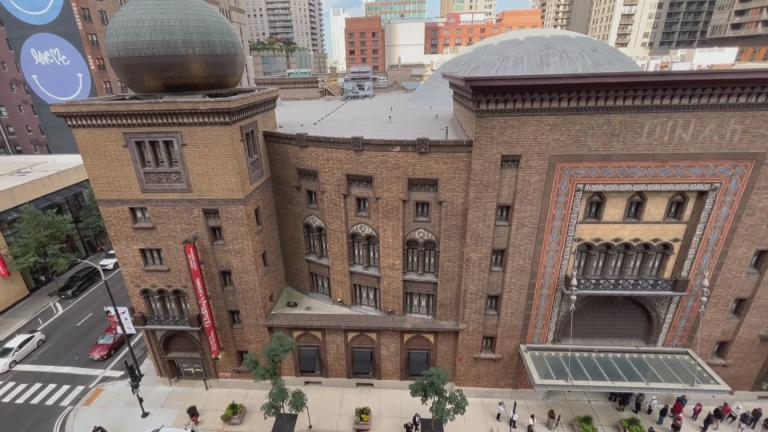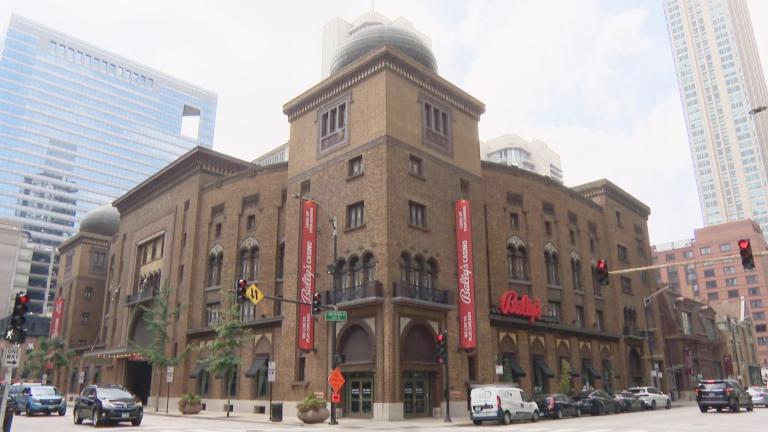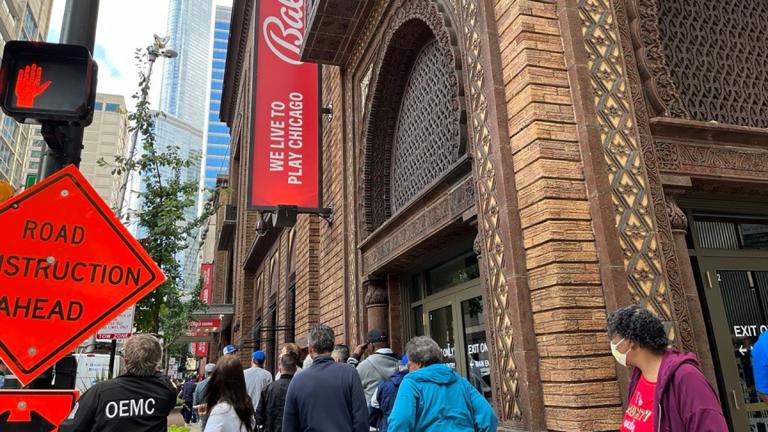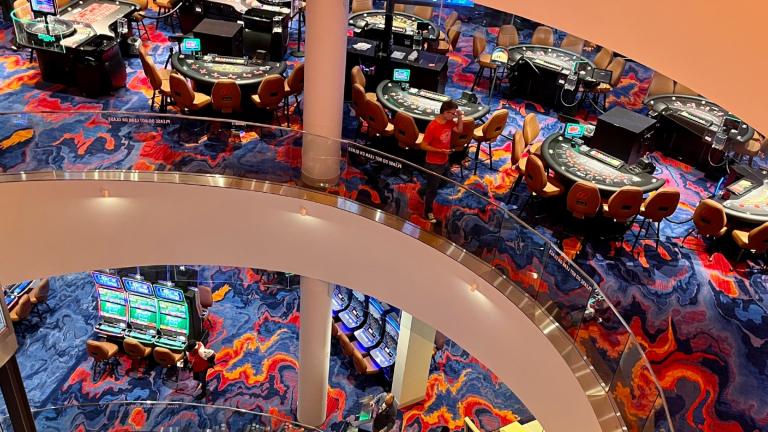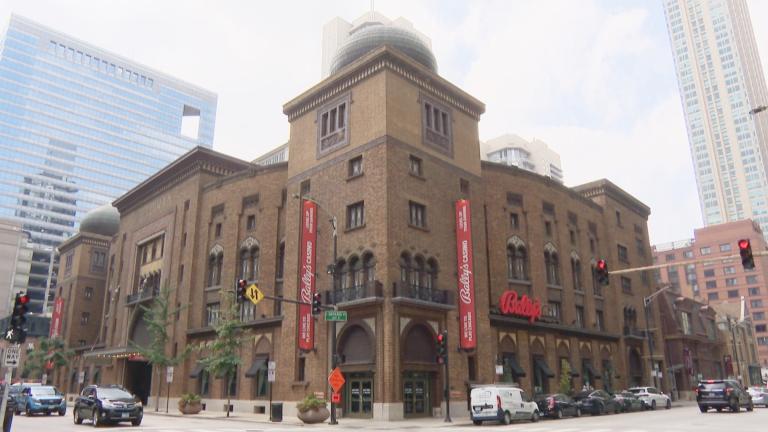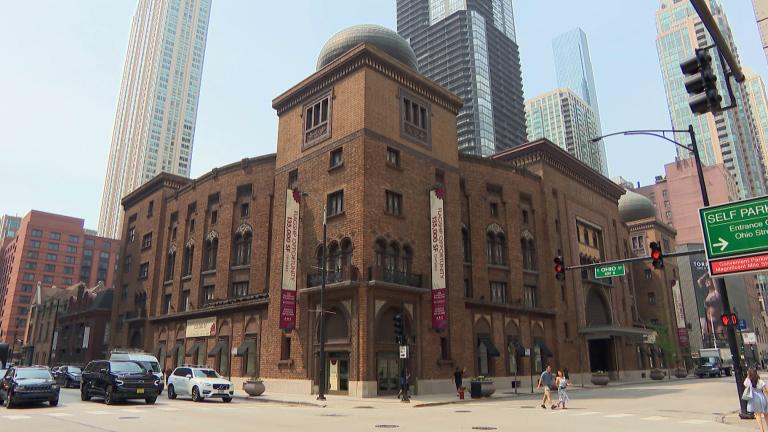Video: In this week’s edition of Spotlight Politics: Fireworks at City Hall over the Chicago Casino proposal. Details of an FBI wiretap on former Illinois House Speaker Mike Madigan. And dueling GOP gubernatorial debates. Our politics team of Amanda Vinicky, Paris Schutz and Heather Cherone takes on those stories and more. (Produced by Paul Caine)
The Chicago City Council voted 41-7 on Wednesday to go all in on a plan from Bally’s to build a casino in River West, capping a 30-year odyssey and handing Mayor Lori Lightfoot a significant victory as she prepares to run for a second term as Chicago mayor.
The $1.73 billion proposal now heads to the Illinois Gaming Board, which must license Bally’s to operate the Chicago casino set to be built along the Chicago River near Chicago Avenue and Halsted Street.
The casino and resort would replace what is now the Chicago Tribune printing plant and newsroom, forcing the newspaper to relocate its operations.
The City Council members who voted against the deal were Ald. Brian Hopkins (2nd Ward), Ald. Anthony Beale (9th Ward), Ald. Ed Burke (14th Ward), Ald. Raymond Lopez (15th Ward), Ald. Byron Sigcho Lopez (25th Ward), Ald. Michele Smith (43rd Ward) and Ald. Brendan Reilly (42nd Ward).
Ald. Sophia King (4th Ward) recused herself from the vote on the casino because her husband is a partner in a law firm involved in the casino deal.
“I understand people have to stand up for their communities,” Ald. Jason Ervin (28th Ward) said. “But we have to stand up for the whole city. Government does not run on hopes and prayers.”
Members of the City Council’s Progressive Caucus said they voted for the casino plan reluctantly, criticizing the rushed and unprecedented process to hold the final vote on Wednesday. Several said Lightfoot’s agreement to earmark a $40 million upfront payment from Bally’s for the city’s underfunded police and fire pensions earned their support.
But Reilly and Hopkins said they did not believe that the casino would help stabilize Chicago’s finances, while Smith objected to the changes the casino is sure to bring to the ecologically sensitive Chicago River.
“I've done the math on this,” Reilly said. “It doesn't add up for me.”
Ald. Walter Burnett, whose 27th Ward is set to be home to the casino and resort, urged his colleagues support the casino.
“We have to do something,” Burnett said.
The debate was punctuated by a screaming match between Sigcho Lopez and Lightfoot after the Pilsen alderperson called the casino approval process a sham.
“I think as legislators we have the responsibility to review this process, a failed process, in an administration that is more worried about campaign contributions than doing the right thing for the city of Chicago,” Sigcho Lopez said.
Lightfoot erupted in anger.
“You are a liar! You are a liar here! I sit here and I will not tolerate you besmirching the hard work of so many people who have worked on this!” Lightfoot yelled from the rostrum. “Almost every word that comes out of your mouth after you say your name is a lie!”
Lightfoot and Sigcho Lopez have clashed frequently over the past three years.
When Hopkins said that he believed Bally’s was selected after a rigged process, Lightfoot did not respond.
Even if the revenue projections are not realized, whatever the casino generates will be “better than nothing,” Burnett said.
Before Wednesday’s crucial vote, City Council members heard impassioned pleas from representatives of Chicago’s powerful hospitality unions, who said the 3,000 construction jobs the casino is expected to create every year and the 3,000 permanent jobs were desperately needed in an industry that has yet to recover from the economic catastrophe triggered by the COVID-19 pandemic.
For weeks leading up to the vote, Lightfoot pressed members of the City Council to act quickly, and allow revenue to start flowing from a temporary casino at the Medinah Temple in River North as soon as next year. A permanent casino could open as soon as early 2026.
Lightfoot is expected to run for re-election, and will no doubt emphasize that she succeeded in bringing a casino to Chicago in three years after former Mayors Richard M. Daley and Rahm Emanuel failed for 30 years. Lightfoot was able to convince state lawmakers to revise the tax structure for a Chicago casino in May 2020.
The mayor used her post-City Council news conference to take a victory lap.
“It goes without saying that this is a major, major milestone for our city,” Lightfoot said.
Soo Kim, chairman of the Bally's Corporation board, beamed while Lightfoot spoke.
“We asked the city of Chicago to bet on Bally’s and you have,” Kim said.
Bally’s was one of three firms to submit a proposal to build a casino in Chicago in November, and appeared to have the inside track in the winner-take-all contest after a study from the city’s gaming consultant found the Bally’s casino would be the most lucrative for the city and its sister agencies, ringing up $191.7 million in its sixth year of operations.
Bally’s is the only one of the three finalists that does not operate another nearby casino, giving the firm an incentive to maximize efforts to drive gamblers and revelers to their Chicago casino and resort — boosting the city’s share of its revenue, according to that study.
Bally’s will also offer the city an upfront payment of $40 million for the license, and $4 million annually, the mayor’s office announced. Initially, Bally’s offered the city an upfront payment of $25 million.
Bally’s also inked an agreement with the Chicago Federation of Labor to ensure construction and casino workers are allowed to unionize. In addition, the casino firm promised that 60% of the jobs created by the casino will be filled by Black, Latino or Asian workers.
Bally’s will also create a jobs program specifically targeting Chicago neighborhoods with the highest levels of unemployment and lowest income, according to the mayor’s office.
Lightfoot is counting on a casino to boost the city’s economy and funnel approximately $200 million into its police and fire pension funds, significantly easing the pressure on the city’s finances, while creating thousands of jobs and drawing tourists — and their fat wallets.
Bally’s $1.73 billion casino would have 3,400 slots and 173 table games. The resort would have six restaurants and cafes in addition to a food hall and three bars and lounges. It would also feature a 3,000-seat, 70,000-square-foot concert venue and a 20,000 square-foot event venue in addition to outdoor bars, lounges and pools along the Chicago River.
Bally’s has put together a consortium — the Chicago Community Builder’s Collective — of design and construction firms owned by Black, Latino and female Chicagoans to work on the project.
Bally’s has told city officials they will meet the requirements imposed by city officials that 25% of the facility be owned by Black, Latino or Asian shareholders, 50% of its employees be from Chicago and at least 26% of the construction contracts go to firms owned by women or Black, Latino or Asian Chicagoans.
Contact Heather Cherone: @HeatherCherone | (773) 569-1863 | [email protected]

